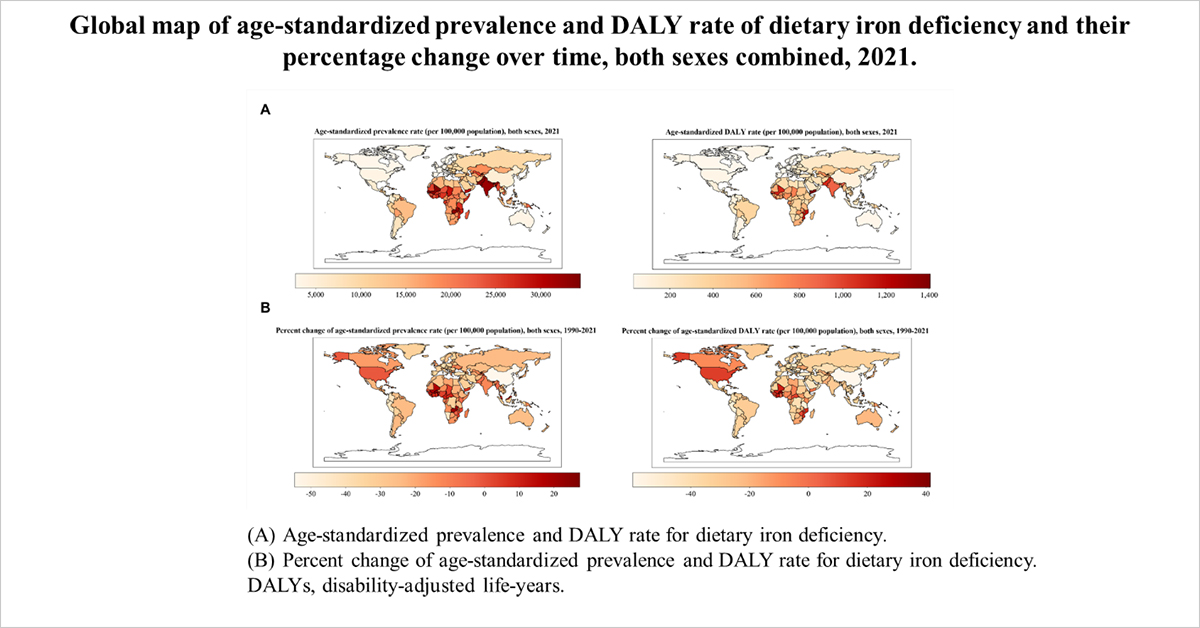News
Kyung Hee Undergraduate Leads First Ever Global Study on the Disease Burden of Dietary Iron Deficiency
2025-05-21 Research

Professor Dong Keon Yon's research team at the College of Medicine has produced the first scientific quantification of the global disease burden attributable to dietary iron deficiency, using big data from 204 countries, disaggregated by year, gender, and age. Student Sooji Lee (Medicine, ’19) served as first author.
This large-scale study involved the collaboration of approximately 900 global research teams, including the Institute for Health Metrics and Evaluation (IHME) at the University of Washington, the Gates Foundation, and Harvard Medical School. The findings were published in the May issue of Nature Medicine (IF 58.7), the world’s most prestigious medical journal published by Nature, under the title, “Global, regional and national burden of dietary iron deficiency from 1990 to 2021: a Global Burden of Disease study.”
Student Sooji Lee (Medicine, ’19) of the College of Medicine served as the first author of the article. Participating through the undergraduate research program, she led the entire process—from data interpretation to manuscript preparation. The undergraduate research program enables students to pursue independent research topics under faculty supervision, yielding a range of notable outcomes. This research, published in a leading international journal of the highest academic standing, stands as a compelling testament to the potential impact of the program.
Providing practical evidence for establishing public health policies based on the Global Burden of Disease study
This study is the first to quantify the health impact of anemia symptoms caused by dietary iron deficiency from 1990 to 2021, using prevalence and Disability-Adjusted Life Year (DALY) indicators derived from the Global Burden of Disease Study (GBD 2021), a dataset that tracks disease burden worldwide. Whereas previous research addressed iron deficiency under the broader category of iron deficiency anemia, this study isolates dietary iron deficiency as an independent variable. The distinction is significant, as it offers actionable evidence for shaping public health policy by linking insufficient dietary iron intake to measurable health outcomes.<

As of 2021, the global age-standardized prevalence of dietary iron deficiency was estimated at 16,434.4 per 100,000 people, with associated DALYs reaching 423.7. DALYs, or disability-adjusted life years, quantify the total number of years lost to ill health, disability, or premature death—offering a comprehensive measure of disease burden. Approximately 1.27 billion individuals were affected worldwide, with prevalence among women nearly twice that of men. The most vulnerable populations were infants aged 6 to 11 months and the elderly, while South Asia and sub-Saharan Africa bore the heaviest regional burden. Although the global disease burden has declined modestly since 1990, the disparity between high- and low-income countries remains pronounced. Notably, the reduction in burden has been smaller among women than men, and in some countries, the situation has deteriorated. These persistent inequities are largely driven by systemic barriers, including limited dietary diversity, insufficient access to supplementation, and rising food costs.
Iron deficiency is an urgent global health issue designated by the World Health Organization (WHO). It has also been formalized within the UN Sustainable Development Goals and the WHO 2025 Global Nutrition Targets, underscoring its urgency at both policy and implementation levels. In this context, the present study is the first scientific policy-based research on a global scale that responds to these international goals. It provides practical evidence that can be used in the future to establish nutrition improvement policies by the WHO and health organizations of each country. By delineating intervention priorities for women, children, and the general population of low-income countries, the study is poised to serve as a critical reference in operational decision making in the field of international development, where strategic precision and resources optimization are of critical importance..

Professor Yon emphasized, "This study exemplifies Kyung Hee’s leadership at the forefront of the global health and medical consortium. I believe it will offer timely and practical contribution, particularly as international policy attention and urgency intensify around the global nutrition goals of the WHO."
Student Lee expressed her gratitude, saying, “I have published more than 20 SCI-level articles through the undergraduate research program. It may sound daunting for undergraduate students to engage research on their own, but I was able to conduct world-class research with the warm guidance and encouragement of my professor and the research team.” She added, “I hope the results of this study will offer meaningful support in shaping informed medical policy decisions.”

-
News List
-
Kyung Hee Undergraduate Leads First Ever Global Study on the Disease Burden of Dietary Iron Deficiency
2025-05-21
More -
-
-
Highlight News
-
Info
- University Communication & Press
- +82-2-961-0106
- khsd3080@khu.ac.kr

